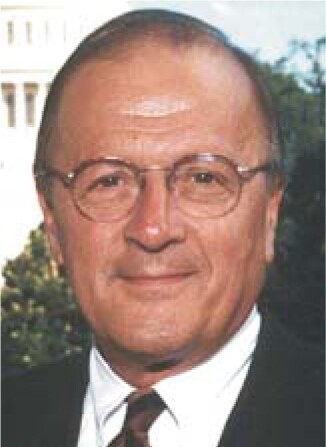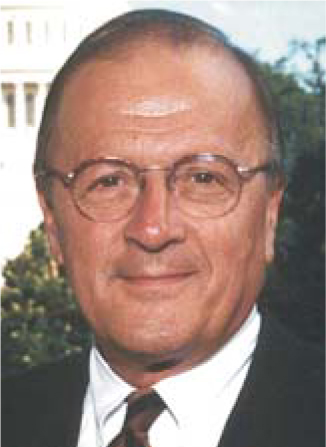Boehlert brought science to the forefront on Capitol Hill
DOI: 10.1063/1.2387081
Sherwood Boehlert isn’t subtle about his interests. Step into his office in the Rayburn House Office Building on Capitol Hill, and you see two white cabinet doors covered with signatures—one from astronauts who have flown in space and the other from major-league baseball players who have made it into the Hall of Fame.
When Boehlert announced last March that he was ending his 24-year career as the Republican congressman from the New York district that includes the National Baseball Hall of Fame in Cooperstown, political pundits wrote articles in which they worried about the loss of an increasingly rare “moderate” Republican and one of the last “down the middle” players in Washington. In announcing his retirement, Boehlert said he was proud of the moderate label because he believes “that the overwhelming majority of thinking people reject the extremes of the left and the right.”
Although Boehlert spent his career advocating for environmental issues, his visibility in the science community increased dramatically six years ago after he became chairman of the House Committee on Science and one of the most forceful proponents in Congress for more funding for basic science research and K–12 science education. He quickly moved the science committee beyond its former reputation as being just “the space committee” dealing with NASA’s budget and not much else.
Boehlert has held hearings on global climate change, the collapse of the World Trade Center buildings, hurricane forecasting, cybersecurity, corporate average fuel economy (CAFE) automotive standards, problems with the National Oceanic and Atmospheric Administration satellite system, and scores of other science-related issues. He lists the increased power of the science committee as one of his top accomplishments. “I’d like to think I’m identified with taking that committee from JV status to varsity,” he said. “It’s in the big leagues now.”
Sitting in his office, across a table stacked with baseballs signed by greats of the game, Boehlert talked with Physics Today about the state of science in the polarized atmosphere of Washington.
PT: You’ve been given credit for turning the science committee into an important player on the hill. Do you think it will maintain that status after you leave?
BOEHLERT: I hope so, because there is the general realization now in Congress that the world has changed. I’m reminded constantly that the great bubble of the 1990s, the boom in our economy, came because of investment in technology. We’re the age of technology. The agricultural age, the industrial age, all of these ages are behind us. This is the new information age, and unless we do a better job of investing in long-term research and development, we’re not going to maintain our preeminent position.
The new dynamic, the thing that really changed the equation and was immensely helpful, was the National Academy of Sciences report, Rising Above the Gathering Storm [see Physics Today, December 2005, page 25
PT: Despite the economic importance of science, it typically isn’t on the center stage of political debate. How do you sell science to your colleagues?
BOEHLERT: Few, if any, of my colleagues campaigned on the idea that they were going to come to Washington and do everything in their power to convince Congress that we have to address basic R&D and do a better job of science and math education. They campaign on dealing with the war on terrorism, on how we’ve got to extricate ourselves in an honorable way from Iraq. Or on social security problems and prescription drug benefits for the elderly. I’m trying to convince them that there is something else you can campaign on. As a matter of fact, I’ve provided them with a textbook guide on how to do it—the American Competitiveness Initiative.
PT: With the budget tight and deficits high, where do you get money for science?
BOEHLERT: I made a big pitch for more investment in R&D last year, culminating with the December 6th innovation meeting [based on the Gathering Storm report] at the Commerce Department. We met with Josh Bolten [then head of the Office of Management and Budget], and his response was that it was a good idea, but where were we going to get the money? I said there is an odd-shaped building [the Pentagon] on the other side of the bridge that wastes more than we’re talking about on a coffee break. And that doesn’t mean I’m not a hawk on defense. But, we’re talking about a few billion dollars. So I suggested that.
To the credit of this administration … the president announced the American Competitiveness Initiative in his State of the Union address. Oftentimes the State of the Union is nothing but a feel-good, rah-rah pep talk. But there it was, in black and white, the administration requesting money to put the National Science Foundation, the Office of Science in the Department of Energy, and NIST on a path to double their budget over 10 years. Bolten followed through. We were heard. We were heeded.
PT: But the administration has a reputation as being anti-science, or at least of ignoring science it doesn’t like.
BOEHLERT: I tell people I work in a town where everyone likes to say they are for science-based decision making until the scientific consensus leads to a politically inconvenient conclusion. Then they want to go to plan B, and I’m not referring to the morning-after pill. There is a perception out there that there is an organized attempt within the administration to muzzle science, to change science, or to ignore science. I don’t think there is any effort from on high to muzzle science. I think there is a conscious effort to question science. And I think, in some instances, there is an attempt to ignore science.
Every time I’ve had a discussion with the president, I’ve told him, “Mr. President, every time I’ve talked with you about an issue in my zone of responsibility—global climate change, CAFE standards, issues like that—I always feel better.” Then I pause for effect, and say, “It’s your staff that screws up.”
PT: How good are scientists at understanding the Washington political system?
BOEHLERT: In the eyes of many in the scientific community, politics is viewed as dirty business where you get your hands soiled if you get involved. I find that scientists are not particularly good at lobbying for their interests, or at making difficult choices like people in the public arena have to make every day. I mean, do you invest more for cancer research or heart research?
PT: What do scientists need to do to keep science visible as an issue in Washington?
BOEHLERT: I tell them all the time, whether it is the science community or the business community, that it’s not rocket science. In January there will be a swearing in of 50 or 60 new [House] members. Make sure you get these new members, during their first year, before they shape their approach to policy, and tell them how important science is. And you don’t do it by knocking at their door with a high-priced lobbyist from Washington. You do it by getting your university researcher from the university back home, you get the corporate people in from their home turf, and you say this is very important, not just for America, but for our [congressional] district. Look at what science produces in terms of benefits for your district.
PT: You’re out of here at the end of the congressional session. What are you going to do?
BOEHLERT: Whatever I damn well please.

Boehlert
DAVIS SIMS





